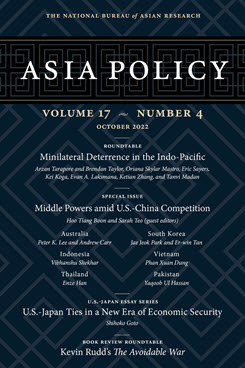Essay in Asia Policy 17.4
Australia’s Great-Power Threat Perceptions and Leadership Responses
This essay argues that Australia’s choices in the U.S.-China rivalry have been significantly shaped by the different role conceptions of the country’s prime ministers, producing outcomes at odds with structural expectations for middle-power behavior.
EXECUTIVE SUMMARY
MAIN ARGUMENT
Australia’s relations with China and the U.S. are in a state of flux. Relations with Beijing have turned antagonistic, though trade continues apace. Meanwhile, relations with Washington seem infused by intimacy, yet also feature regular bouts of divergence. Three explanations are commonly offered to explain Australia’s evolving relations with both great powers: the changing balance of power, alliance pressure, and national interests. However, none of these sufficiently explain variations in why and how Australia has behaved in recent years. Instead, the different role conceptions of Australia’s three prime ministers between 2013 and 2022—Tony Abbott, Malcolm Turnbull, and Scott Morrison—better explain Australia’s choices. Specifically, a typology of role conceptions based on these leaders’ domains of interest and desire for change shows how they responded differently to similar external pressures and thus demonstrates the decisive impact of leaders in how middle powers respond to great powers. It is still too early to identify Anthony Albanese’s leadership role conception, given his recent election in May 2022, but a domestic role conception is likely.
POLICY IMPLICATIONS
- Australia’s recent choices and actions toward China and the U.S. have been far more contingent and leader-driven than is often reflected in the debate over middle-power responses to great-power competition.
- A deeper appreciation of domestic political dynamics and the personal motivations of national leaders can help explain responses that do not conform to straightforward balancing choices.
- There is considerable scope for middle-power agency even as domestic and international constraints narrow the availability of alternative leadership role conceptions.
Peter K. Lee is a Research Fellow in the United States Studies Centre at the University of Sydney and a Korea Foundation Research Fellow in the Asia Institute at the University of Melbourne (Australia).
Andrew Carr is a Senior Lecturer in the Strategic and Defence Studies Centre at the Australian National University (Australia).
About Asia Policy
Asia Policy is a peer-reviewed scholarly journal presenting policy-relevant academic research on the Asia-Pacific that draws clear and concise conclusions useful to today’s policymakers. Asia Policy is published quarterly in January, April, July, and October and accepts submissions on a rolling basis. Learn more


